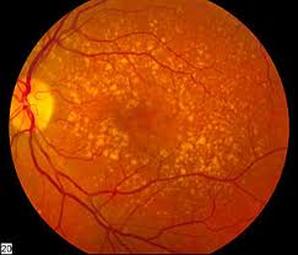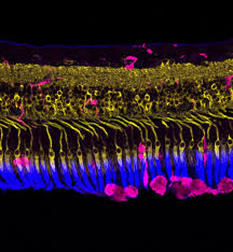|
A highlight of the EURETINA Congress held in Vienna in September was the announcement, for the first time, of the results of a study which showed that a new laser treatment - known as Retinal Rejuvenation Therapy or 2RT - reverses the ageing changes in Macular Degeneration (AMD) and leads to a substantial reduction in advancement to the late stages of AMD, including Wet AMD. Up until this time, there has been no treatment for Dry AMD and the worry for many with this disease has been that there was no preventive therapy that could reduce their chances of progressing to the late stages of Wet AMD. It now appears likely that there will soon be a laser that, simply and painlessly applied to the eye in the clinic over a few minutes, could prevent the late stages of AMD and the risk of requiring monthly eye injections for life! It is very pleasing that the study was conducted in our Victorian capital city of Melbourne, at the Royal Victorian Eye and Ear Hospital, and that the new laser is built just across our state border, in Adelaide! The LEAD (Laser Intervention in Early Age-related Macular Degeneration) trial was conducted at the Centre for Eye Research Australia (CERA) in Melbourne. The treatment consists of a sub-threshold laser (using energy settings so low as to not cause visible damage to the retina). Each laser pulse is delivered over a very short time - measured in nanoseconds (or billionths (1/1,000,000,000s) of a second). The 2RT laser is made by Ellex Medical Lasers in Adelaide, SA. Click the button below to find out more about the 2RT laser: Click the button to access the link to the CERA webpage: It has been shown that the laser causes microscopic changes to the lining of the macula, the RPE or retinal pigment epithelial cells, which then regenerate. In the regeneration process, it is thought that high levels of enzymes, known a MMPs (matrix metallo-proteinases), are produced which then clear up the waste products of cells, which collect under the macula in AMD.  The laser results in a reduction in the yellow spots under the macula, known as drusen, consisting of waste deposits that are unable to be cleared by the ageing cells that leads to early and intermediate AMD. However, the laser also results in a four fold reduction in many of the late signs of AMD that are known to progress to wet AMD. While the results of this study need to be validated by future studies, these results are a very positive sign that very effective treatment for Dry AMD is just around the corner and that we may soon be able to prevent many people from needing eye injections. These are very exciting times indeed!
1 Comment
24/11/2020 12:12:58 pm
That's amazing that the LEAD trial has shown success in painlessly preventing the late stages of AMD. We think my grandmother has macular degeneration. We'll take her to an eye doctor for diagnosis and be sure to ask about the LEAD trial.
Reply
Your comment will be posted after it is approved.
Leave a Reply. |
AuthorDr Vincent Lee, Archives
April 2020
Categories
All
|
Proudly powered by Weebly



 RSS Feed
RSS Feed